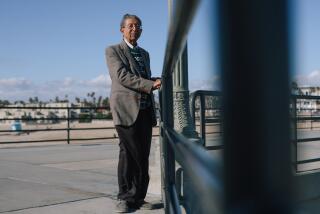Religion, prayer and government
Americans have a convoluted history when it comes to mixing government and religion, reflecting an ambivalence that dates to the nation’s earliest days. At the same time the framers of the Constitution were creating separation between church and state, they were starting legislative meetings with religious invocations and allocating money for Christian missions for Native Americans.
A recent court ruling held that the National Day of Prayer is unconstitutional. But Christmas is a national holiday, and, on Wednesday, the Supreme Court ruled that a cross may remain on a national preserve in the Mojave Desert because it somehow serves as a universal memorial of war dead no matter what their religious backgrounds.
And if that sounds mixed up, consider the patchwork of customs related to prayer before government meetings. According to a 2007 roundup of practices across the country by Religion News Service, about a third of the meetings of the New Jersey Legislature begin with a prayer offered “in the name of Jesus Christ,” at the same time that a federal court ordered the Indiana House of Representatives to end references to particular religions’ deities in pre-lawmaking prayers. Though the House called on clergy to “strive for an ecumenical prayer,” the court found that more than half the prayers were Christian. In Ohio, religious leaders who offer prayers before House meetings must avoid content that is “denominational, sectarian or proselytizing.” Although many legislative bodies invite clergy representing different religions to give invocations, the board of supervisors of a county in Virginia rejected a Wiccan priestess on the grounds that invocations “are traditionally made to a divinity that is consistent with the Judeo-Christian belief.”
Into this welter of confusion arrives the Lancaster City Council, which invites clergy from throughout the city to start its meetings with a prayer. Almost always, these are Christian clergy. The American Civil Liberties Union fired off a warning letter to the city, saying there had been complaints about the number of these prayers that are given “in the name of Jesus Christ” or with other clear references to specific religions. The city countered with a ballot measure, which voters passed last month, supporting a continuation of the current practice.
But voters’ preferences cannot overrule constitutional protections or legal precedent in such matters. If a government body is promoting the establishment of religion, that’s a violation of the 1st Amendment. The problem is that the courts have not always been clear; often, the particular circumstances of a case play a role in the decision. In 1983, for instance, the Supreme Court held that starting a legislative session with prayer does not violate the Constitution; it pointed to this country’s long history of beginning government meetings with prayer, though it also noted that the prayer involved was ecumenical in nature and did not advance one religion over another. Such traditional prayer in civic settings has become a part of the culture, the justices wrote. This concept has come to be known as “ceremonial deism.” But the exception applies only to legislative bodies, including city councils; it does not allow even nondenominational prayer as a formal part of a public school day, though in many schools students recite the Pledge of Allegiance, including its “one nation, under God” clause.
A 2000 Superior Court decision narrowed in on situations like the one in Lancaster. Ruling on prayers before Burbank City Council meetings that used the phrase “in the name of Jesus Christ,” the court said that invoking a deity specific to one religion implies an endorsement of that religion by the city government. Ecumenical prayers are thus considered kosher; denominational prayers are not.
We agree. People of varying religious beliefs should be able to attend council meetings, or any other legislative sessions, without feeling marginalized. That’s true even for meetings where the council goes out of its way to invite religious leaders of different faiths to give the invocation. Muslims should be able to do business before the council without hearing prayers about Jesus; Hindus should be able to attend these meetings without prayers to Allah, and so forth. And as a practical matter, given the dominance of Christian congregations in almost all corners of the country, a rotating guest list is going to result more often than not in Christian prayer.
The Supreme Court ruling on the Mojave cross invokes the same objections; despite the reasoning of the court majority, among non-Christians a cross is not an all-American symbol of those who died in battle or of anything else. It is the symbol of a religion they are not a part of.
How, then, is it possible to justify any prayer to a divine being at a government meeting? Though a nondenominational prayer might satisfy the vast majority of Americans, aren’t atheists, agnostics, members of polytheistic religions and, for example, Buddhists — whose faith does not include a belief in a supernatural-related God — entitled to feel equally comfortable at these sessions?
Though the Constitution is clear on the subject of government taking steps that establish the dominance of one religion, it does not eliminate the possibility of any and all public religious activity. That’s why the National Day of Prayer, though it might be off-putting to some Americans, falls into a different category than sectarian prayers at council meetings. No public money is spent to advance one religion over another; the day doesn’t interfere with anyone’s efforts to be involved in government. But there is no getting around the fact that what the courts call nonsectarian prayer is actually polysectarian monotheistic prayer. To someone who isn’t from one of those faiths — primarily Christianity, Judaism and Islam — this sure looks like establishment of a particular religious belief.
In a country where people of so many religious beliefs live shoulder to shoulder, there is going to be a level of discomfort for everyone. Just as atheists might feel injured by any mention of God at city council meetings, some Christians — Lancaster Mayor R. Rex Parris, for example, who supported the measure on sectarian prayer — will feel that government is trying to diminish their religion if a pastor cannot mention Jesus in a public prayer.
Parris says that the ruckus in Lancaster has prompted him and other city leaders to begin a series of discussions geared toward promoting greater intercultural understanding. Good for him. While he’s at it, we hope he comes to realize that although the Constitution guarantees him the right to pray as he wishes as a private citizen, it also guarantees others the right to perceive that their government isn’t taking sides in the religion wars.
More to Read
Sign up for Essential California
The most important California stories and recommendations in your inbox every morning.
You may occasionally receive promotional content from the Los Angeles Times.










